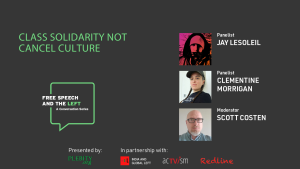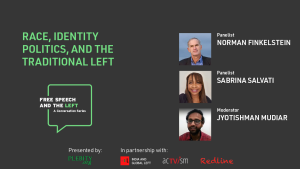This is Part 2 of our two-part series on how to survive cancellation. If you missed last week’s column, start there first!
So you’ve been cancelled. The mob came for you, and suddenly your friends, your career, and probably your hope in humanity have all disappeared in what feels like the blink of an eye.
But you’re a survivor. You weathered the sudden storm, got your physical and material needs under control, and managed to pull yourself out of the pit of despair.
Now what?
During the crisis in the days and weeks that closely follow cancellation, there’s a lot to do. If you followed our guide from last week, you’ve been applying for benefits, finding a new short-term gig to help make ends meet, spending lots of time with whatever supportive friends you have left, and possibly even moving back home. In the short term, just doing everything you have to do to physically and emotionally survive is a lot. But once the dust settles, the crisis has passed, and you have your basic needs under control… that’s when reality sets in.
This doesn’t just happen with cancellation. If you’re anything like me, a crisis of any sort can kick you into reaction mode—just doing whatever you need to do to make sure everyone is okay.
When my mom passed away in 2015, I felt this same experience. In the aftermath of her death, there was just so much to do. I had a to-do list a mile long for the first week. There were calls to make, logistics and legal jargon to sort out, my younger siblings to take care of, and a funeral to plan. I was sad, I knew I was, but I didn’t have time to really feel that feeling until after her funeral. After staying with my siblings at my aunt’s house for a week where we had set up a family crisis base of operations, returning home to my apartment, where I lived alone, meant finally confronting the reality of the situation. The truth had only just begun to sink in.
“But once the dust settles, the crisis has passed, and you have your basic needs under control… that’s when reality sets in.”
Cancellation, like the death of a loved one, is a loss. It can be the loss of a job, the loss of friends, the loss of community, the loss of home, the loss of a sense of safety and security, the loss of a future you had planned, and, often, the loss of an identity.
After the immediate crisis passes, when you are forced to get back to some semblance of “normal,” can be when the weight of these losses really hits the hardest.
Most people I know who have been cancelled define their life in two stages: The Before, and The After. The change is often one so great that it impacts nearly every aspect of your life. For some, being “cancelled” becomes a new, defining part of their identity.
For me, cancellation proved that I couldn’t rely on others for my financial safety. It also proved that anchoring my support system in a community that required strict adherence to a particular ideology was untenable. I decided I needed freedom, and set out to create a life for myself centered around this idea.
That being said, I didn’t have much of a game plan. I started out writing regularly on Medium as a source of freelance income. I had no idea when I started doing this that 4W, which began as a publication on Medium just to house my own feminist writing, would turn into the platform that it is today. At the time, my goal was just to make $1,000/month in income from Medium. Soon, though, it became clear that my account was at risk of being banned for sharing gender-critical content. I set up my own site, 4W.pub, began migrating over my content, and started a Patreon.
“I decided I needed freedom, and set out to create a life for myself centered around this idea.”
When I was inevitably banned from Medium (more on that here) my new goal became to just replace the income I had made on that platform with my own Patreon. Eventually, I did.
As I started to build my reputation, gain subscribers, and meet new people in the movement, I had the opportunity to take on other work. This allowed me to invest more into 4W, and now nearly the entire income from 4W goes straight back into the community to pay our feminist writers and editorial staff.
People often ask me “How did you start 4W?”, but there isn’t one single answer. The truth is, I started writing. Then, I needed to take steps to continue doing that writing. I just kept doing the next logical step in response to a series of events—and now here we are.
Building back after a cancellation, especially when it comes to a career, doesn’t necessarily require having a Grand Plan. I used to be a planner, determined to lay out my entire life and career ten years in advance. But cancellation has taught me to respond to moments, be willing and able to pivot on a dime, and take opportunities as they come—even if they don’t look how you expect them to. The most important skill you can have to survive cancellation is the skill of learning and adapting.
“The most important skill you can have to survive cancellation is the skill of learning and adapting.”
It’s also important, though, to not let cancellation lead you into self-sabotage. After you’ve been cancelled, it becomes easy to assume that there is no point in trying to meet new people, apply to that job or speaking opportunity, or pursue a particular goal simply because you do not believe anyone will accept you anymore.
The truth is, a lot of people will still accept you. Most of the world (“normal people,” as we call them) aren’t wrapped up in the latest internet culture wars. They might not even care about your so-called transgressions. While trusting people after these experiences doesn’t come easy, continuing to put yourself out there after cancellation is important to making sure you’re not just cancelling yourself. The worst they can say to you is “no.” And then what have you lost?
While you’re still trying to figure out what comes next for you, or what shape your After will take, just remember that you still have the rest of your life ahead of you, and the whole world of opportunity to explore. Let cancellation be your catalyst for a better future—one not prescribed by cultural expectations, but shaped by you with creativity, intentionality, and freedom every step of the way.
Help support people who have suffered material consequences for their free speech, like job loss, by joining the Plebity Free Speech Fund.
You can listen to “Identity Crisis” on Spotify, Google Podcasts, or wherever you get your podcasts. Subscribe to updates on Identity Crisis here: identitycrisis.xyz/get-updates




